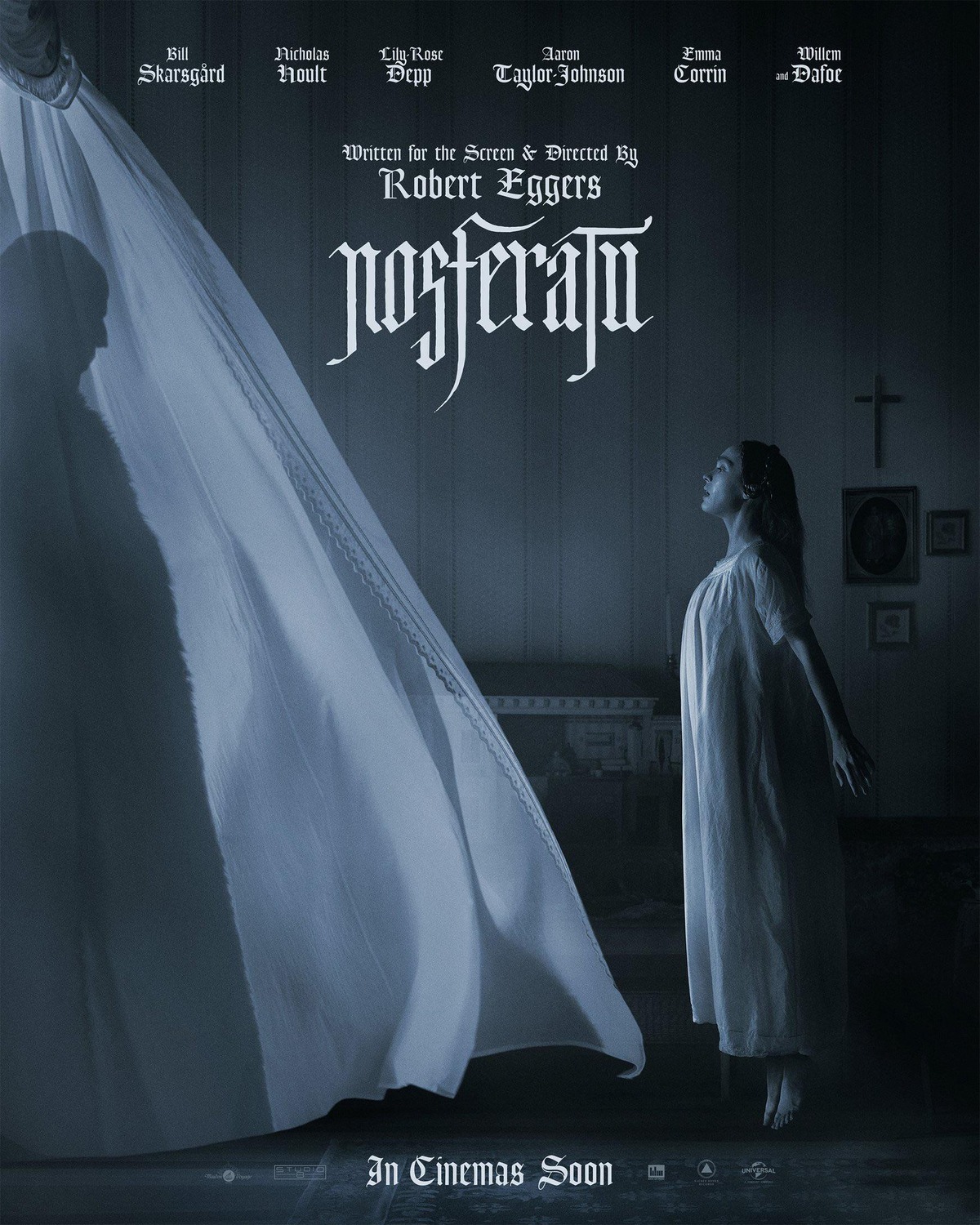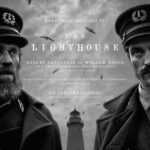Director
Robert Eggers
Starring
Lily-Rose Depp
Nicholas Hoult
Bill Skarsgård
In 1830s Germany, we’re introduced to up-and-coming solicitor Thomas Hutter [Hoult] and his mentally troubled wife, Ellen [Depp]. In order to secure a decent occupational position, Hutter accepts the charge to venture from Wisborg to Transylvania to settle a real estate acquisition for Count Orlok [Skarsgård]. However, upon arrival at the castle, Hutter is tormented by visions and is unable to escape. And all the while the Count sets in motion a plan to travel to Wisborg and claim Ellen as his bride.
The original Nosferatu is a century-old cinematic classic but also a prime example of copyright infringement; specifically in that it was an attempt to produce a story about Dracula without falling foul of legal entanglement. However, over time, it has become iconic in its own right. And starting there is probably the best choice for this analysis. See, it’s just Dracula. Of the countless iterations over the decades, there’s a distinct familiarity to it all. Sure there are changes and improvements made here and there (we’ll come to those later) but the broad strokes remain the same. Subsequently, a large portion of your enjoyment of this release will hinge on whether you’re completely bored of that narrative, or if you revel in yet another jaunt.
One aspect that may convince you to take your time with this release, is Robert Eggers at the helm. Eggers is a master at what he does and his career has been one of gradual escalation in terms of scale and prowess; quickly carving a name for himself as a creative with a distinct visual flare and penchant for period films with a dark twist. As such, Nosferatu feels like a return to the monstrous nature of what a vampire should be. No enigmatic, slick-haired sex symbol, but a living corpse in dated attire and aesthetics. All brought to life with phenomenal, shadowy camera work, silhouettes in the distance, and uncomfortable extreme close-ups of putrid flesh. Not to mention Bill Skarsgård’s deep, rolling, measured voice giving the Count an exhausted, hungry weight.
As stated, Eggers has a noted style and every single frame is structured hypnotically, the sets are bursting with life, and the lighting (what little there is) steeps you in this world. Granted, the dark, smoky cinematography can range on unwatchable if the projectionist hasn’t taken the right steps, (and for eventual home release, you’d better have a good setup to enjoy the darkness) but it forces you to strain into the shadowy recesses, desperately trying to make out more detail. All of which, Jarin Blaschke has achieved without going too far; at no point was I struggling to tell where the characters were or what was happening. Yes, it’s gloomy but it’s not underlit or indistinct. That is, until you factor in the dream-like editing which makes the entire proceedings feel like a a beautiful gothic nightmare.
So, for those who have seen so many adaptations of this story, what refreshing elements are there to deviate from the path of familiarity? Well, the majority, outside of the return to the vampire being a living corpse, is through the character design – albeit with exceptional nuance and subtlety. At its core, Dracula (in all its iterations) is a scandalously lustful story. Sex is simply inescapable. And historically speaking, that means that the female protagonists have almost always been resigned to objects to be won. Here, however, Ellen is a more rounded figure, full of agency, rather than a helpless damsel. Yes, she’s absolutely a target and a victim – as is her best friend and confident, Anna (played by Emma Corrin) – but she also takes matters into her own hands, acknowledges her place in this unfolding assault, and is arguably braver than her male counterparts.
And while we’re talking performances, this is going to be a significant divide for audiences. There are those who will simply accept the theatrical tone and deliveries, and those who will frankly find the melodrama laughable. To my mind, Depp’s performance, while it could be written off as eccentric or excessively flamboyant, 100% fits the setting and tonality. The swaying from hysteria to solemnity is torturous, fragile, fatigued, and free from vanity. And the same can be said for Hoult’s whimpering, Aaron Taylor-Johnson’s captain of industry “by God man” exclamations, and Simon McBurney’s delicious lunacy. Again, if you can’t meet the film where it’s at, you’ll be scratching your head wondering how this wailing pantomimery is being heralded as praiseworthy. But in terms of technical execution, stylistic choice, cinematography and performances, Nosferatu is yet another Eggers masterclass. That said, without an appreciation for subtle horror, creeping dread, and period appropriate reactions, it could just as easily be dismissed as comical, languid, self important, and pointless.
Release Date:
01 January 2025
The Scene To Look Out For:
When Thomas first arrives in Transylvania, he is met by a settlement of Romani locals. A tight network of open-armed but superstitious people, they try to dissuade Thomas from venturing on but he fails to listen. Even though the 1830s is a strange, unfamiliar time and place to modern audiences, so much is achieved in this small arrival scene, and the subsequent vampire hunt that night. All of which provides the viewer with a slip-road into unconventional practices and uncomfortable, impossible truths.
Notable Characters:
There are so many outlandish and wonderful performances in Nosferatu, but the interplay between Sievers [Ralph Ineson] and Von Franz [Willem Dafoe] is fantastically engrossing. Presenting us with a seasoned expert in Dr Sievers and the nonconformist outcast in Von Franz, working together to make rational sense of this Venn diagram of the occult and the scientific.
Highlighted Quote:
“Does evil come from within us or from beyond?”
In A Few Words:
“A visual spectacle, commanded admirably, but one that commits to the narrative a little too faithfully at times to truly give us something new.”
Total Score: 5/5

![The Red Right Hand Movie Reviews [Matthew Stogdon]](https://reviews.theredrighthand.co.uk/wp-content/uploads/2021/12/cropped-header1.png)



